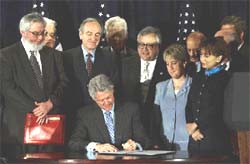No Go
No Go

Some of the chaos outside seemed to permeate into the Convention Center. It was just another day before attention shifted from the protests outside to the proceedings of the meet, and differences between political groups within the wto began to emerge. There were three main groupings: the us, the European Union (eu), and the developing countries. And then there were countless non-governmental organisations (ngos) with a common complaint that global trade rules were given precedence over concerns regarding the environment, health, human rights and countless other matters. The role of Northern NGOs
So prominent was their presence that the possibility of ngos being included in the next round of wto talks to be held in Geneva in 2000 is being considered, especially by usa, which was pleased to hear its opinions reflected in the statements of us ngos. However, the stance adopted by the government of India on the issue of ngo participation was ambiguous. This could go against the interests of the country if the us does succeed in incorporating the support of ngos at wto meets. A case in point is the shrimp and turtle controversy in which the World Wide Fund for Nature played a major role. The Indian government fears that Western ngos may reflect certain environmental concerns which, if linked to trade agreements, may give the North the power to impose their environmental standards upon developing nations. This may make it impossible for developing nations to engage in global trade.
In Seattle, ngos from the North, though fighting capitalism, were in fact creating hurdles for the poor nations. By pressing for inclusion of environment and labour clauses in trade talks, they were demanding changes that would adversely affect the trade interests of developing countries (see Editor's Page: International pressure and the civil society ).
The view from the South
Disillusioned by the promises made at the Uruguay Round of talks, developing countries were calling for a







